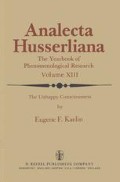Abstract
In the traditional criticism Beckett’s plays have, from the beginning, been dubbed “experimental”; and Godot’s failure in Miami proved that a profound tragic sense can become confused when it is expressed in surface ironic humor. That experience should have proved only that Beckett was never the victim of the inauthentic plights of his heroes. Although the Miami fiasco was in a sense tragic, it was a natural consequence of an inept reading and of the ridiculous commercialism of the American theater. In spite of his multifarious uses of the “convenience” of philosophy to structure his fictional worlds, his own world view remains a matter of conjecture, unimportant for the interpretation of his works; and Godot’s reception in Miami1 touched his actors more than it did Beckett himself.
Access this chapter
Tax calculation will be finalised at checkout
Purchases are for personal use only
Preview
Unable to display preview. Download preview PDF.
References
See the account of same, supra, Ch. VIII.
See Heidegger, Being and Time, pp. 91 ff.
See Ibid., pp. 96–102.
Heidegger has made this commentary on his own principal work in criticism of Sartre’s use of it. See his Über den Humanismus (Frankfurt am Main: Klosterman, 1946) pp. 15–16. See also Being and Time, p. 171.
Drama tische Dich tungen, II, p. 515.
Ibid.
See Heidegger, Being and Time, pp. 171–72.
Come and Go,’ in Breath and Other Shorts (London: Faber and Faber, 1971), p. 19.
That was in the French version; in the original English, the expression was toned down to the startled ‘Oh!’ — Ibid.
In English, ‘God grant not.’ - Ibid.
Ibid., p. 21; the characterizations of these seven positions as determinations of the developing drama are my own.
See the original version, Le Visible et Vinvisible (Paris: Gallimard, 1964), pp. 252, 268,316,317–18,321.
Author information
Authors and Affiliations
Rights and permissions
Copyright information
© 1981 D. Reidel Publishing Company, Dordrecht, Holland
About this chapter
Cite this chapter
Kaelin, E.F. (1981). The Limits of Theater. In: The Unhappy Consciousness. Analecta Husserliana, vol 13. Springer, Dordrecht. https://doi.org/10.1007/978-94-009-8522-3_11
Download citation
DOI: https://doi.org/10.1007/978-94-009-8522-3_11
Publisher Name: Springer, Dordrecht
Print ISBN: 978-94-009-8524-7
Online ISBN: 978-94-009-8522-3
eBook Packages: Springer Book Archive

